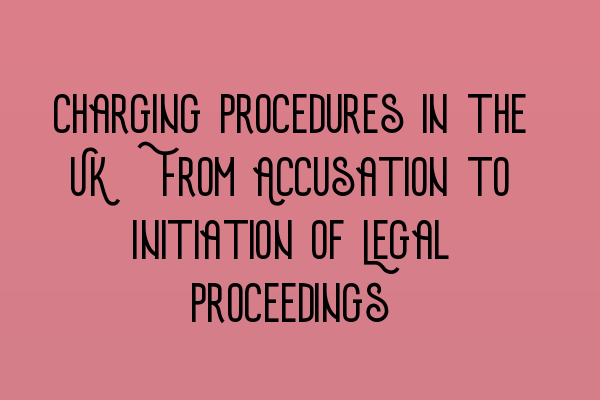Charging Procedures in the UK: From Accusation to Initiation of Legal Proceedings
When it comes to criminal law cases in the UK, understanding the charging procedures is of utmost importance. From the moment an accusation is made to the formal initiation of legal proceedings, each step in the process plays a critical role in determining the outcome of the case. In this blog post, we will delve into the key stages involved in charging a person with a criminal offense and shed light on the significance of each step.
1. Initial Accusation:
The first step in the charging process is an initial accusation, where a person is suspected of committing a criminal offense. This accusation can come from various sources, including victims, witnesses, or law enforcement agencies. It is crucial for individuals facing accusations to seek legal advice as soon as possible to understand their rights and possible defenses. Qualified solicitors can provide the necessary guidance and assistance throughout the entire process.
2. Investigation:
Following an initial accusation, a thorough investigation takes place to gather evidence and determine the validity of the accusations. Law enforcement agencies, such as the police, play a significant role in conducting investigations. They collect evidence, interview witnesses, and analyze the facts surrounding the case. Additionally, if necessary, forensic experts may be called upon to provide their expertise. This stage is critical for both the prosecution and the defense to build a strong case that supports their respective arguments.
3. Arrest and Interview:
If the investigation yields sufficient evidence, the next step is the arrest of the suspect. After the arrest, the suspect must undergo an interview with the police. It is crucial for individuals under arrest to exercise their right to remain silent until they have legal representation present. This step is essential to ensure that the suspect’s rights are protected throughout the process and that any information given is in line with legal requirements.
4. Charge or Release:
Following the interview, the police will consider the evidence gathered during the investigation and determine whether there are reasonable grounds to charge the suspect. If the evidence is deemed insufficient, the suspect may be released without charges. However, if there is enough evidence supporting the accusations, the suspect will be officially charged with the alleged offense. This decision does not determine guilt or innocence but signifies that a formal legal process will begin.
5. Receiving Legal Representation:
Once charged, it is crucial for individuals to secure legal representation to navigate the legal proceedings that lie ahead. Qualified solicitors specializing in criminal law can provide expert advice, guide their clients through the entire process, and ensure their rights are protected. Seeking legal assistance early on can make a significant difference in building a robust defense strategy.
6. Pre-Trial Stage:
During the pre-trial stage, both the prosecution and defense prepare their cases. This involves gathering additional evidence, interviewing witnesses, and potentially negotiating plea bargains. Legal experts examine the strength and weaknesses of the evidence presented by the prosecution and develop a defense strategy accordingly. It is essential for individuals to work closely with their solicitors during this stage to achieve the best possible outcome for their case.
7. Trial and Judgement:
If the case proceeds to trial, the court will hear arguments and evidence from both the prosecution and defense. The judge or jury will then assess the evidence, evaluate witness testimonies, and reach a verdict. The decision may be guilty or not guilty, depending on the strength of the evidence presented. It is worth noting that the burden of proof rests with the prosecution to prove guilt beyond a reasonable doubt.
Each step in the charging process has its own significance and impact on the outcome of a criminal law case. From the initial accusation to the initiation of legal proceedings, every individual involved needs to understand their rights, seek legal advice, and provide the necessary support to build a strong defense. At SQE Criminal Law & Practice Law UK, we offer comprehensive SQE 1 and SQE 2 preparation courses for aspiring solicitors. For further practice quizzes and mocks, go to our related articles on
or
SQE 1 Practice Mocks FLK1 FLK2.
For more information on SQE 2 preparation courses and SRA SQE exam dates, please visit our
and
pages.
If you or someone you know are facing criminal charges, do not hesitate to contact our team of expert solicitors at SQE Criminal Law & Practice Law UK. We are here to provide the legal support and guidance needed to navigate the charging procedures effectively and protect your rights throughout the process.
Remember, understanding the charging procedures is crucial, and having the right legal representation can make all the difference in achieving a favorable outcome for your case.
Disclaimer: Please note that this blog post is for informational purposes only and does not constitute legal advice. If you require specific legal advice, it is recommended to consult a qualified solicitor.
